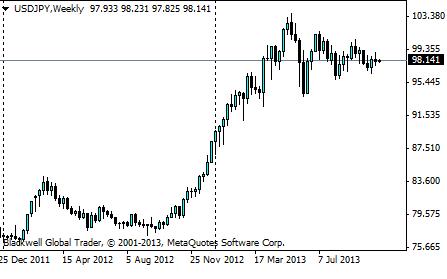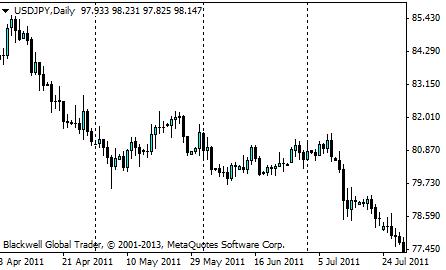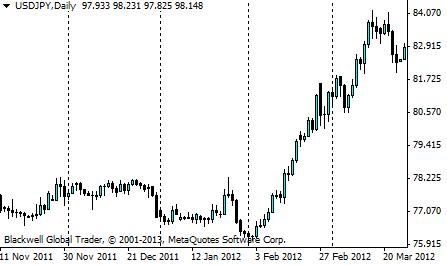Japan has recorded a trade deficit for the 15th consecutive month. Despite the Japanese economy expanding by an impressive 3.8% over the second quarter, such a large deficit is a high cause of concern for their economy. Critics are suggesting that the era known as “Abenomics” has contributed towards this.
Abenomics devalues the currency and supports the price of exports, making them competitive again. While it has helped Japan’s exports become less expensive for their trading partners, a natural disaster has meant that Japan is far more reliant on importing from other countries than it previously was.
Overall, Abenomics has seen the JPY devalued against the USD by nearly 25% over the past year. USD/JPY" title="USD/JPY" height="277" width="464">
USD/JPY" title="USD/JPY" height="277" width="464">
Imports have climbed by 16.5% in the past month. On the other hand, exports have increased by only 11.5%. The Japanese trade deficit has expanded by an astonishing 64% in the previous year.
Having such a high trade deficit has further devalued the currency to greater depths and there are several reasons to indicate that their trade deficit may carry on increasing in the future, which could lead to the JPY depreciating even more.
Negative implication of Fukishima:
In March 2011, Japan was devastated by a magnitude 9.0 earthquake that led to a tsunami. The damage caused led to a nuclear meltdown, where radioactive materials were released into the atmosphere. Since this unfortunate incident, Japan has shut down all of their 50 nuclear power plants.
Previously, the nuclear energy sector supplied Japan with one third of all their power. It took a full one year for the JPY to witness the effects of the Fukishima disaster. After the event, a repatriation of funds actually led to the JPY strengthening.
 USD/JPY" title="USD/JPY" height="277" width="464">
USD/JPY" title="USD/JPY" height="277" width="464">
(Graph showing the USD/JPY depreciated following the Fukishima disaster)
 USD/JPY" title="USD/JPY" height="277" width="464">
USD/JPY" title="USD/JPY" height="277" width="464">
(Graph one year on, showing the JPY finally depreciating and realising the Fukishima affects)
An inherent problem with having such a devalued currency is that it increases the prices of imports. Nobody initially realised the severe ramifications of the Fukishima power plant disaster. Japan are now importing substantially more than they were previously. In fact, since the catastrophe, Japan have imported 84% of their energy requirements.
At present, there is no real indication of when the 50 nuclear power plants within Japan will be reopened. Analysts suggest that Japan will carry on importing high proportions of their energy requirements, until their internal issues are resolved.
This leads me to believe that the trade deficit will carry on appreciating, further devaluing the power of the JPY currency.
Loss of manufacturing momentum:
Regrettably, the Fukishima disaster also had negative repercussions for Japan’s manufacturing industry. In 2010, Toyota was the world leader in car sales, however they dropped to 3rd by 2011. The natural disaster left a devastating effect on Japan’s supply chain, leading to a wide decrease in sales revenue.
Japan was previously looked upon as a manufacturing powerhouse, but natural disasters, alongside increased competition from neighboring countries like China, Vietnam, Korea and Thailand have had a detrimental effect on their market share.
Right now, manufacturing equates to 18% of Japan’s GDP. It was hoped that Abenomics will lead to Japan having a greater manufacturing market share.
After all, the country is famous for their innovation in technology and automobiles. Nintendo, and Sony products are manufactured in Japan, alongside Mitsubishi and Toyota cars. Japan is also recognised for manufacturing pharmaceutical products.
The only problem is that exports need to show increased growth at a faster pace, otherwise any gains will be supplanted by Japan’s reliance on energy imports.
Global economic slowdown:
Japan received high praise for delivering a 3.8% second quarter GDP expansion. However, it is expected that economic growth will slow to 2.8% in 2014 and 1.1% in 2015.
This means Japan’s exports may decrease in the future. There is a likelihood that this will encourage the trade deficit to carry on widening in the future, leading to a further devaluation in the JPY.
Elsewhere, China’s annual economic growth slowing down will have an adverse impact on Japan’s trade deficit. In 2012, China constituted 12 % of Japan’s exports but if China’s economy does slow down, this may correlate to China importing less from Japan in the future.
On the other hand, Japan heavily imports from China. Last year alone, they imported approximately 30% of their goods from their neighbors. If Chinese economic growth does begin to slow down, this will lead to Japan’s trade deficit growing even wider.
In conclusion, there are reasons to be concerned about Japan’s growing trade deficit.
It is quite obvious that although devaluing the currency has positive effects on businesses looking to export their products, this hasn’t offset the rate at which Japan is importing from other nations. We are unsure about the long term implications this may have on the Japanese economy.
In my opinion, Japan is likely to witness a trade deficit for some time to come.
Written by Jameel Ahmad, Research Analyst from Blackwell Global.
Follow Jameel on twitter @JameelAhmadFX.
- English (UK)
- English (India)
- English (Canada)
- English (Australia)
- English (South Africa)
- English (Philippines)
- English (Nigeria)
- Deutsch
- Español (España)
- Español (México)
- Français
- Italiano
- Nederlands
- Português (Portugal)
- Polski
- Português (Brasil)
- Русский
- Türkçe
- العربية
- Ελληνικά
- Svenska
- Suomi
- עברית
- 日本語
- 한국어
- 简体中文
- 繁體中文
- Bahasa Indonesia
- Bahasa Melayu
- ไทย
- Tiếng Việt
- हिंदी
The Unease Behind Japan’s Trade Deficit
Published 10/23/2013, 11:29 PM
Updated 05/14/2017, 06:45 AM
The Unease Behind Japan’s Trade Deficit
3rd party Ad. Not an offer or recommendation by Investing.com. See disclosure here or
remove ads
.
Latest comments
Install Our App
Risk Disclosure: Trading in financial instruments and/or cryptocurrencies involves high risks including the risk of losing some, or all, of your investment amount, and may not be suitable for all investors. Prices of cryptocurrencies are extremely volatile and may be affected by external factors such as financial, regulatory or political events. Trading on margin increases the financial risks.
Before deciding to trade in financial instrument or cryptocurrencies you should be fully informed of the risks and costs associated with trading the financial markets, carefully consider your investment objectives, level of experience, and risk appetite, and seek professional advice where needed.
Fusion Media would like to remind you that the data contained in this website is not necessarily real-time nor accurate. The data and prices on the website are not necessarily provided by any market or exchange, but may be provided by market makers, and so prices may not be accurate and may differ from the actual price at any given market, meaning prices are indicative and not appropriate for trading purposes. Fusion Media and any provider of the data contained in this website will not accept liability for any loss or damage as a result of your trading, or your reliance on the information contained within this website.
It is prohibited to use, store, reproduce, display, modify, transmit or distribute the data contained in this website without the explicit prior written permission of Fusion Media and/or the data provider. All intellectual property rights are reserved by the providers and/or the exchange providing the data contained in this website.
Fusion Media may be compensated by the advertisers that appear on the website, based on your interaction with the advertisements or advertisers.
Before deciding to trade in financial instrument or cryptocurrencies you should be fully informed of the risks and costs associated with trading the financial markets, carefully consider your investment objectives, level of experience, and risk appetite, and seek professional advice where needed.
Fusion Media would like to remind you that the data contained in this website is not necessarily real-time nor accurate. The data and prices on the website are not necessarily provided by any market or exchange, but may be provided by market makers, and so prices may not be accurate and may differ from the actual price at any given market, meaning prices are indicative and not appropriate for trading purposes. Fusion Media and any provider of the data contained in this website will not accept liability for any loss or damage as a result of your trading, or your reliance on the information contained within this website.
It is prohibited to use, store, reproduce, display, modify, transmit or distribute the data contained in this website without the explicit prior written permission of Fusion Media and/or the data provider. All intellectual property rights are reserved by the providers and/or the exchange providing the data contained in this website.
Fusion Media may be compensated by the advertisers that appear on the website, based on your interaction with the advertisements or advertisers.
© 2007-2024 - Fusion Media Limited. All Rights Reserved.
